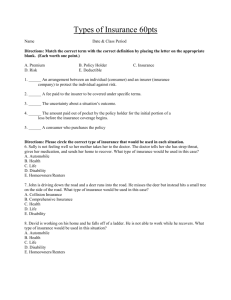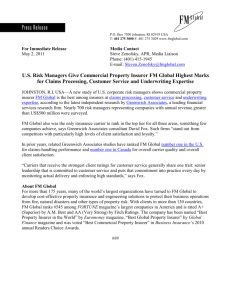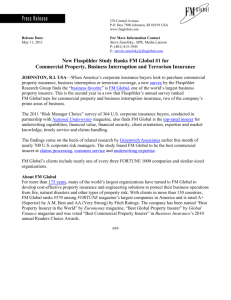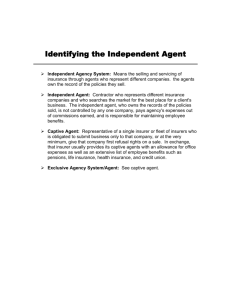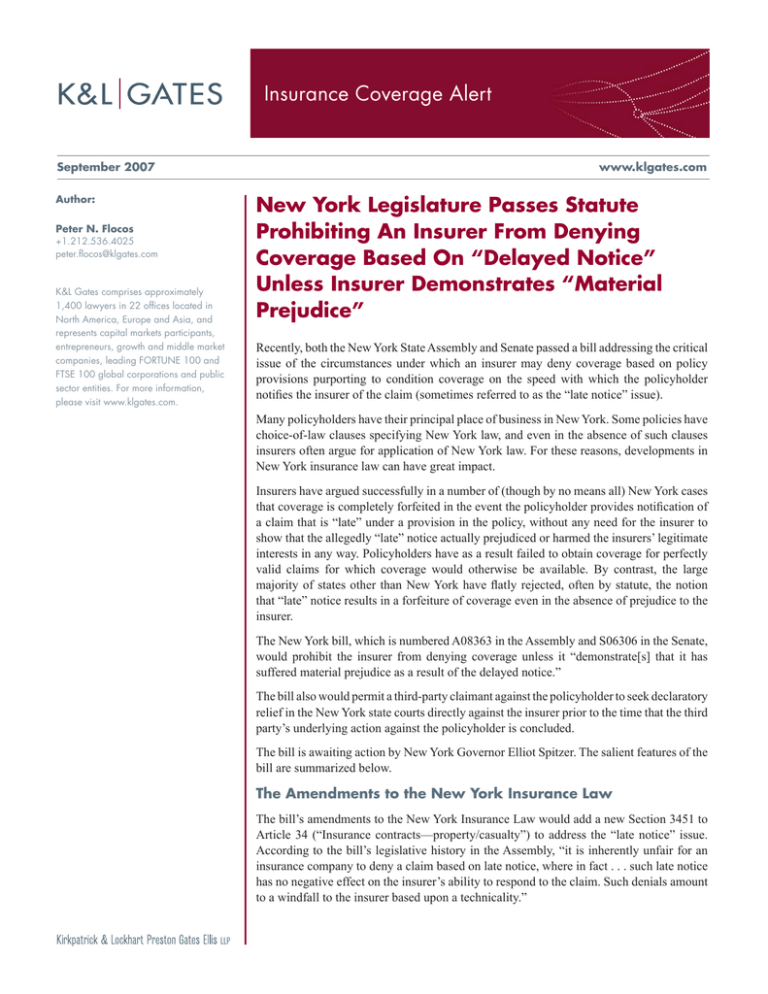
Insurance Coverage Alert
September 2007
Author:
Peter N. Flocos
+1.212.536.4025
peter.flocos@klgates.com
K&L Gates comprises approximately
1,400 lawyers in 22 offices located in
North America, Europe and Asia, and
represents capital markets participants,
entrepreneurs, growth and middle market
companies, leading FORTUNE 100 and
FTSE 100 global corporations and public
sector entities. For more information,
please visit www.klgates.com.
www.klgates.com
New York Legislature Passes Statute
Prohibiting An Insurer From Denying
Coverage Based On “Delayed Notice”
Unless Insurer Demonstrates “Material
Prejudice”
Recently, both the New York State Assembly and Senate passed a bill addressing the critical
issue of the circumstances under which an insurer may deny coverage based on policy
provisions purporting to condition coverage on the speed with which the policyholder
notifies the insurer of the claim (sometimes referred to as the “late notice” issue).
Many policyholders have their principal place of business in New York. Some policies have
choice-of-law clauses specifying New York law, and even in the absence of such clauses
insurers often argue for application of New York law. For these reasons, developments in
New York insurance law can have great impact.
Insurers have argued successfully in a number of (though by no means all) New York cases
that coverage is completely forfeited in the event the policyholder provides notification of
a claim that is “late” under a provision in the policy, without any need for the insurer to
show that the allegedly “late” notice actually prejudiced or harmed the insurers’ legitimate
interests in any way. Policyholders have as a result failed to obtain coverage for perfectly
valid claims for which coverage would otherwise be available. By contrast, the large
majority of states other than New York have flatly rejected, often by statute, the notion
that “late” notice results in a forfeiture of coverage even in the absence of prejudice to the
insurer.
The New York bill, which is numbered A08363 in the Assembly and S06306 in the Senate,
would prohibit the insurer from denying coverage unless it “demonstrate[s] that it has
suffered material prejudice as a result of the delayed notice.”
The bill also would permit a third-party claimant against the policyholder to seek declaratory
relief in the New York state courts directly against the insurer prior to the time that the third
party’s underlying action against the policyholder is concluded.
The bill is awaiting action by New York Governor Elliot Spitzer. The salient features of the
bill are summarized below.
The Amendments to the New York Insurance Law
The bill’s amendments to the New York Insurance Law would add a new Section 3451 to
Article 34 (“Insurance contracts—property/casualty”) to address the “late notice” issue.
According to the bill’s legislative history in the Assembly, “it is inherently unfair for an
insurance company to deny a claim based on late notice, where in fact . . . such late notice
has no negative effect on the insurer’s ability to respond to the claim. Such denials amount
to a windfall to the insurer based upon a technicality.”
Insurance Coverage Alert
The new Section 3451 contains the following
provisions:
Insurer Must Show “Material Prejudice” to
Deny Late Claims. Under proposed Section
3451, the insurer “shall not deny coverage for a
claim based on the failure of an insured to give
timely notice of a claim unless [the insurer] is
able to demonstrate that it has suffered material
prejudice as a result of the delayed notice.”
(emphasis added)
Rebuttable Presumption of No Prejudice.
The statute provides that “[e]vidence that such
insurer had knowledge of the accident, loss,
injury or death that is the subject of the claim,
including” from various specified sources, creates
a “rebuttable presumption that such insurer has
not been prejudiced by delayed notice.”
Notice to Insurer’s Agent Sufficient. The statute
also states expressly that “[n]otice given to any
licensed agent of such insurer in this state with
particulars sufficient to identify the insured shall
be deemed notice to such insurer.”
No Definition of “Material Prejudice.” Proposed
Section 3451 does not define the term “material
prejudice.” Although courts presumably will have
to apply that term on a case-by-case basis, the
term should be construed liberally in favor of the
policyholder under the terms of the statute (see
below).
Liberal Construction. The statute states expressly
that the “provisions of this section shall be liberally
construed in order to effectuate the purpose hereof
which is to mitigate against the potential for
procedural denial of insurance coverage resulting
in unreasonable loss of insurance protection for
claimants.”
The bill also states that Section 3451 “shall apply to
all insurance contracts executed, issued, reissued or
renewed on or after” the date of the bill1 and would
be “applicable to all insurance coverage in the state
issued pursuant to this article and to every insurance
contract executed, issued, reissued or renewed on or
after the effective date of this section by an authorized
insurer subject to the provisions of this article,” except
as provided in Article 51 (“Comprehensive motor
vehicle insurance reparations”). The scope of Article
34 is such that Section 3451 would encompass at least
third-party liability and first-party property policies.
The Amendments to the New
York CPLR Regarding Declaratory
Judgments
The bill also would amend the New York Civil Practice
Law and Rules (“CPLR”) provision on declaratory
judgments (CPLR 3001) to provide that “a party who
has interposed a claim against another party may bring
a declaratory judgment action for a determination of
the existence or extent of coverage owed by an insurer
subject to the provisions of Article Thirty-Four of the
Insurance Law to the party against whom the original
claim is interposed.”
This language would permit a third-party claimant
against a policyholder to bring a direct action for
declaratory relief against the insurer without waiting
for its underlying action against the policyholder to be
concluded. Current Section 3420 of the Insurance Law
has been interpreted to prevent declaratory actions
against an insurer by the third party until after the third
party has obtained a judgment against the policyholder
(although either the policyholder or the insurer may
initiate a declaratory action against the other at any
time an actual controversy has developed).2
The bill’s legislative history in the Assembly explains
that the intention of the legislation is to permit
declaratory actions regarding coverage rights to be
commenced “at the onset of a lawsuit,” without having
to wait for the underlying action to be concluded. The
declared goals are to avoid delay, the “inefficient use
of judicial resources” and imposing a “burden” on
the injured party, and to achieve a “more streamlined
litigation process, along with certainty and prompt
payment for a plaintiff.”
1
The bill is dated June 17, 2007 and passed the New York
Senate on June 20, 2007 and the New York Assembly on June 21,
2007.
2
See Lang v. Hanover Ins. Co., 3 N.Y.3d 350, 820 N.E.2d 855,
787 N.Y.S.2d 211 (2004).
September 2007 | 2
Insurance Coverage Alert
Conclusion
Signature by Governor Spitzer of the proposed
legislation would be of significant benefit to
policyholders and would bring New York “notice” law
clearly into line with the law of the large majority of
other states, at least with respect to policies executed,
issued, reissued or renewed on or after the bill’s
effective date. If the bill does become law, however, it
remains to be seen what effect it will have on insurer
“late notice” defenses under policies issued prior to
the effective time of the bill, and on cases in which the
insurer alleges failure by the policyholder to satisfy
a condition other than notice, such as a condition
requiring the policyholder to cooperate with the
insurer.
K&L Gates comprises multiple affiliated partnerships: a limited liability partnership with the full name Kirkpatrick & Lockhart Preston Gates Ellis
LLP qualified in Delaware and maintaining offices throughout the U.S., in Berlin, and in Beijing (Kirkpatrick & Lockhart Preston Gates Ellis LLP
Beijing Representative Office); a limited liability partnership (also named Kirkpatrick & Lockhart Preston Gates Ellis LLP) incorporated in England
and maintaining our London office; a Taiwan general partnership (Kirkpatrick & Lockhart Preston Gates Ellis) which practices from our Taipei
office; and a Hong Kong general partnership (Kirkpatrick & Lockhart Preston Gates Ellis, Solicitors) which practices from our Hong Kong office.
K&L Gates maintains appropriate registrations in the jurisdictions in which its offices are located. A list of the partners in each entity is available
for inspection at any K&L Gates office.
This publication/newsletter is for informational purposes and does not contain or convey legal advice. The information herein should not be used
or relied upon in regard to any particular facts or circumstances without first consulting a lawyer.
Data Protection Act 1998—We may contact you from time to time with information on Kirkpatrick & Lockhart Preston Gates Ellis LLP seminars
and with our regular newsletters, which may be of interest to you. We will not provide your details to any third parties. Please e-mail london@
klgates.com if you would prefer not to receive this information.
©1996-2007 Kirkpatrick & Lockhart Preston Gates Ellis LLP. All Rights Reserved.
September 2007 | 3


